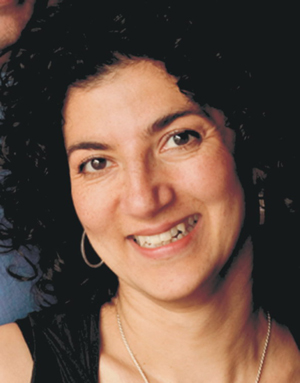
Recently some friends dropped by, and I found myself rushing to the kitchen to find some food to put out. "You're such a homemaker!" exclaimed one of them when I returned with a tray of sliced mango, cheese and pickles, which was all I could find in the fridge. "But in a good way," she quickly added, when she saw me wince.
I certainly don't think of myself as a homemaker -- I'm far too messy and have a high tolerance for bathroom scum -- and when I hear the word I immediately think of that awful 50s stereotype, the one in old commercials who lived and breathed to please.
But I do, like my own mother, love to feed people. I feel compelled to put out snacks for guests, and I get an intense feeling of satisfaction from preparing and serving good meals for friends and family, meals that I conjure out of fresh nutritious ingredients. Real food.
Meeru Dhalwala knows this feeling. It's one she says she can't explain in words when she sits down to a meal with her kids. But it's one she thinks women should be proud of.
It's the feeling that inspired her to bring together 15 women from 15 very different backgrounds to cook their own 'real meals' for the Joy of Feeding, a fundraiser taking place this weekend at the UBC farm.
The event is set up like a food fair, explains Dhalwala, where guests get to visit 15 different booths where each mom will be preparing and serving a dish from her home country -- everything from salmon burgers to Filipino Chicken Adobo, to Ukrainian cabbage rolls to Gyoza.
"These are not professional chefs," says Dhalwala, who founded the world-famous Vij's Indian fusion restaurant in Vancouver with her husband Vikram Vij. "None of the food will be what you'd get at a five-star restaurants. It's delicious, it's simple, it's what they actually cook at home. If it can encourage more people to cook, fantastic."
A special kind of club
When she assembled all the women together for the first time recently, Dhalwala wasn't sure what to expect. One of the participants is a 70-year-old grandmother who has struggled to keep her kids fed, another is a executive who freezes meals for her husband and kids when she travels to Moscow on business, another is a single mom from Zimbabwe, brand new to this country.
"We're talking about women of different ethnicities, women who had never met each other," says Dhalwala. "They're all different moms of different backgrounds, but you put them together in one room and they talk about two things: my children, and what I cook for them. There were absolutely no barriers, it's almost like they belong to a club."
Although Dhalwala instinctively thought of mothers when she organized the event, her goal for The Joy of Feeding is to get more people cooking period, not just women.
The inspiration for the event came to her last fall, when she participated in a panel discussion on how to build a healthy local food economy. Cooking, she realized was one of the ingredients that no one was talking about. How can a society take control of its food and build food security if people are losing the ability to cook?
Dhalwala is the first to admit that cooking can be drudge work -- "sometimes it is just not fun" -- but she and the 15 women taking part agree that it is a choice that they make: a choice to do something good for themselves and their loved ones. And it's a choice that Dhalwala thinks society ought to value more.
As women, is this compulsion to cook, to feed, a societal responsibility, foisted up on us? Or is it biological, genetic, "something we have in us?" asks Dhalwali. "I'm not sure."
"I do know that I love to feed," she says. "And to me, cooking, even though I don't feel like doing it, I do it because I know the end result, when I sit there at the table with my family and the pleasure that I get knowing we're not doing cheap takeout, I'm not serving them frozen meals, I've actually made the effort and have the inherent satisfaction of knowing what's going in their body."
Vital knowledge passed on
Dhalwala, like many of the mothers in the Joy of Feeding, learned to cook from her own mother, who made it her job to made lunch on Saturdays.
"The only two things I liked eating for lunch that were Indian was chickpeas and rice and kidney bean and rice," she says. "My mom taught me how to make those two dishes. And when you learn how to make those two basic dishes, you learn how to chop garlic, chop onion and chop tomatoes.
"That is actually the most important thing. It's not the actual cooking, it's learning how to use a knife. The whole act of knowing how to chop, and knowing what to do with those chopped vegetables, how to sauté them in a bit of oil."
Dhalwala says several things have contributed to what she considers a loss of cooking skills in today's society. One is the glamourization of food preparation that we see on food television. "You'd never see somebody in a cooking show cooking in messy kitchen, with a bunch of dirty dishes in the sink and chopping with a cheap little knife they bought at Safeway," she says. "So I think relating your little apartment kitchen, for example, to what they're showing on television is where that subliminal disconnect happens."
Another other is the easy availability of prepared food. "I don't want to sound like a hypocrite -- I earn my living selling you prepared foods," adds Dhalwala who is the force behind Vij's Rangoli packaged meals. "I'm not saying don't eat out, don't treat yourself to a takeout meal, what I'm saying is don't let that be a norm."
Dhalwala notes that the more one learns about cooking, the more affordable food options are available to them.
"You don't need boneless skinless chicken breast, you can buy drumsticks, you can buy chicken thighs," she says. "There are many people who are low-income, but I think that many are not so low-income that they cannot afford to make a good pot of beans and rice and have a little bit of chicken for flavouring. We don't even really need that much meat in our diets anyway. If you know how to cook, you can be creative." ![]()
Read more: Local Economy, Food
















Tyee Commenting Guidelines
Comments that violate guidelines risk being deleted, and violations may result in a temporary or permanent user ban. Maintain the spirit of good conversation to stay in the discussion.
*Please note The Tyee is not a forum for spreading misinformation about COVID-19, denying its existence or minimizing its risk to public health.
Do:
Do not: